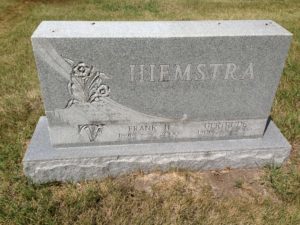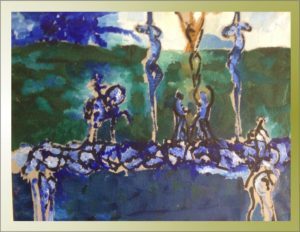Stephen W. Hiemstra's Blog, page 187
April 22, 2019
Easter. Monday Monologues, April 22, 2019 (podcast)
 Stephen W Hiemstra, 2018
Stephen W Hiemstra, 2018By Stephen W. Hiemstra
In today’s podcast, I offer a prayer and reflect on Easter.
After listening, please click here to take a brief listener survey (10 questions).
To listen, click on the link below:
Hear the words; Walk the steps; Experience the joy!
Easter. Monday Monologues, April 22, 2019 (podcast)
Also see:
Monday Monologue On March 26, 2018
Other ways to engage online:
Author site: http://www.StephenWHiemstra.net, Publisher site: http://www.T2Pneuma.com.
Newsletter: http://bit.ly/Lent_2019b
The post Easter. Monday Monologues, April 22, 2019 (podcast) appeared first on T2Pneuma.net.
April 21, 2019
Mark 16: Easter (3)
 By Stephen W. Hiemstra
By Stephen W. Hiemstra
“And he said to them, Do not be alarmed. You seek Jesus of Nazareth, who was crucified.
He has risen; he is not here. See the place where they laid him” (Mark 16:6 ESV).
One of the most vivid memories I have as a young person was the experience of an Easter sunrise. Easter is mysterious, earth-shattering news. How could I sleep through it?
Funeral
At my grandfather’s funeral, I was given a head of wheat which hangs now in my kitchen. The wheat reminds me of Jesus’ saying: “Truly, truly, I say to you, unless a grain of wheat falls into the earth and dies, it remains alone; but if it dies, it bears much fruit” (John 12:24 ESV).
Resurrection Reminders
The mystery of resurrection is everywhere in nature. Sunrise is the resurrection of the day. Springtime is the resurrection of the seasons. The metamorphosis from caterpillar to cocoon to adult butterfly is a beautiful, dramatic resurrection. The Apostle Paul writes: “all of creation groans in anticipation of our redemption” (Romans 8:19-23).
Messianic Prophecies
Prophesies of Jesus’ resurrection start early in scripture. Systematic theologians see salvation history as creation, fall, and redemption. Because sin is the cause of death, eternal life requires forgiveness of sin which is brought about in Christ’s resurrection. This transition is prophesied in Genesis: “I will put enmity between you and the woman, and between your offspring and her offspring; he shall bruise your head, and you shall bruise his heel” (Gen 3:15 ESV).
Other theologians see resurrection arising out of righteous suffering. The prophet Job writes not only of Christ, but his own resurrection: “For I know that my Redeemer lives, and at the last he will stand upon the earth. And after my skin has been thus destroyed, yet in my flesh I shall see God, whom I shall see for myself, and my eyes shall behold, and not another” (Job 19:25-27 ESV). At the birth of the church on Pentecost (Acts 2:27), the Apostle Peter sees resurrection prophesied by King David: “For you will not abandon my soul to Sheol, or let your holy one see corruption” (Psalm 16:10).
When asked to produce a sign Jesus himself spoke of the sign of Jonah (Luke 11:29-32). In the belly of the whale Jonah prayed: “I called out to the LORD, out of my distress, and he answered me; out of the belly of Sheol I cried, and you heard my voice” (Jonah 2:2 ESV). And the whale spit him out on dry land, another resurrection story.
Old Testament Resurrections Accounts
Resurrection did not start with Jesus. Some see the story of the binding of Isaac as a resurrection account and a prophecy of the cross (Genesis 22:1-18). The prophet Elisha raises the Shunammite’s son from the dead (2 Kings 4:32-37). In the valley of bones, Ezekiel prophesied about resurrection of the Nation of Israel (Ezekiel 37:3-6). The exodus of the nation of Israel from Egypt and the return of the exiles from Babylon are both resurrection accounts where a dead nation rises to new life.
New Testament Resurrection Accounts
In the gospels, Jesus himself performed several resurrections. He raised Jairus’s daughter from the dead (Mark 5:22-43). He raised the widow’s son (Luke 7:12-17). Most remarkably, after lying four days in the tomb he raised Lazarus from death (John 11:1-45). Like other resurrections, Jesus’ healings and exorcisms brought hope where there was none.
Some scholars believe that John Mark’s gospel recorded Apostle Peter’s testimony while he was in Rome during AD 41-54. Mark later traveled with Paul. Mark’s role was to teach about the life of Jesus. Later, Luke may have assumed this role in Paul’s missionary team.
Mark’s Unusual Ending
Interestingly, Mark did no see the gospel ending with Jesus. Neither did Luke whose gospel was followed by the Book of Acts. Mark’s gospel starts with: “The beginning of the gospel of Jesus Christ, the Son of God” (Mark 1:1 ESV). Scholars believe that Mark’s gospel ends with the woman going out from the tomb to relay the angel’s message: “But go, tell his disciples and Peter that he is going before you to Galilee” (Mark 16:7 ESV). Likewise, our part in salvation history is to pass on the story. As the hymnist Katherine Hankey (1834-1911) writes: “I love to tell the story, of unseen things above, of Jesus and his glory, of Jesus and his love…” [2]
Christian Hope
Christian hope starts with the resurrection: we know that death is not the end of life’s story. And because we know the rest of the story, we can invest in life and live each day with boldness and joy.
Did Abraham believe God would raise Isaac from the dead? Why did the angel have to tell Abraham twice?
[2] www.hymnsite.com/lyrics/umh156.sht
Mark 16: Easter 2
Also see:
A Roadmap of Simple Faith
Christian Spirituality
Looking Back
A Place for Authoritative Prayer
Other ways to engage online:
Author site: http://www.StephenWHiemstra.net, Publisher site: http://www.T2Pneuma.com.
Newsletter: http://bit.ly/Holy_Week_2018
The post Mark 16: Easter (3) appeared first on T2Pneuma.net.
Easter Prayer

Merciful Father:
All praise and honor are yours for you place eternity in our hearts and sent your Son Jesus to save us from our sins.
We confess our foolishness for presuming on your grace and thinking that mercy through Jesus is cheaply available without true devotion and faith.
Thank you for the love that you demonstrated in the death and resurrection of Jesus of Nazareth, our savior and eternal role model.
In the power of your Holy Spirit, dwell in our hearts that Christ’s salvation will nourish our faith daily. Wipe away the despair of loneliness and doubt. Grant us the strength to be faithful stewards of your grace to those around us that your peace may remain our peace, now and always. In Jesus’ precious name, Amen.
Easter Prayer
Also see:
Books, Films, and Ministry
Other ways to engage online:
Author site: http://www.StephenWHiemstra.net, Publisher site: http://www.T2Pneuma.com.
Newsletter: http://bit.ly/Lent_2019b
The post Easter Prayer appeared first on T2Pneuma.net.
April 20, 2019
Mark 15: Holy Saturday (3)
 By Stephen W. Hiemstra
By Stephen W. Hiemstra
“And Joseph bought a linen shroud, and taking him down, wrapped him in the linen shroud
and laid him in a tomb that had been cut out of the rock.
And he rolled a stone against the entrance of the tomb.” (Mark 15:46 ESV)
Jesus is buried on the Day of Preparation which ends at sundown when the Jewish Sabbath begins. This detail in Mark’s Gospel is important because burial was forbidden on the Sabbath and executed criminals could not hang overnight (Deut 21:23). The Gospels mention nothing taking place on the Sabbath while Jesus lay in the tomb and the narrative resumes on the following day. In other words, Jesus rested in the tomb over the Sabbath. Holy Saturday was a day of mourning and grief.
A Grieving Holiday
Grief is more than crying. In Jesus’ Beatitudes, Matthew records: “Honored are those who mourn, for they shall be comforted.” (Matt 5:4) Luke records: “Honored are you who weep now, for you shall laugh.” (Luke 6:21) Both accounts of this Beatitude are written in the form of a lament which has two parts. In the first part, one empties the heart of all grief and pain and anxiety in prayer to God; in the second part, having been emptied the heart turns to God in praise. In the lament, when we grieve, we make room in our hearts for God.
The Theology of Lament
The most famous lament in the Bible is cited by the Gospel of Mark as Jesus’ last words: “My god, my god, why have you forsaken me?” (Mark 15:34) These words come from Psalm 22 verse one which turns to God in verse 19: “But You, O LORD, be not far off; O You my help, hasten to my assistance.” At a time when much of scripture was memorized, rabbis would cite the first part of a passage knowing that the audience would fill in the missing part. Knowing this tradition, Jesus could cite the first verse in Psalm 22 knowing that people hearing him would know the Psalm and how it ended.
Jesus gave us a template for dealing with grief the night before during his prayer in Gethsemane. Mark records that Jesus’ prayed three times: “Abba! Father! All things are possible for You; remove this cup from Me; yet not what I will, but what You will.” (Mark 14:36). Jesus is aware that he stands before the cross and does not want to die; still, he yields to God’s will. Each time we face pain and grief we are faced with a decision: do we turn to God or do we turn into our grief? Our identity is crafted from a lifetime of such decisions.
Joseph of Arimathea
The story of Joseph of Arimathea is instructive. Mark records: “Joseph of Arimathea, a respected member of the council, who was also himself looking for the kingdom of God, took courage and went to Pilate and asked for the body of Jesus.” (Mark 15:43) Asking for the body of a man just crucified for sedition took guts. Yet, with no expectation of resurrection, on a day when Jesus’ inner circle was in hiding and in fear, Joseph “took courage” and asked Pilate for the body of Jesus. Then, he buried him in his own grave [4].
Holy Saturday Reveals our Theology
Holy Saturday is a time to reflect on Christ’s crucifixion. Are we among those happy to see Jesus in the tomb or are we looking forward to the kingdom of God like Joseph of Arimathea?
Footnotes
Burial is work, hence forbidden on the Sabbath (e.g. Deut 5:12-15).
Also: Matthew 27:46. The direct citation of an Aramaic expression—“Eli, eli, lama sabachthani?” in both the Mark and Matthew accounts makes it more likely that these are the actual words of Jesus. This is because the most important expressions in the Bible are cited directly rather than translated or, in this case, the actual words are both cited and translated.
Jesus does exactly that in Matthew 21:16 citing Psalm 8:2.
[4] What a picture of substitutionary atonement—Jesus was buried in my grave so that I do not have to be.
Mark 15: Holy Saturday 2
Also see:
A Roadmap of Simple Faith
Christian Spirituality
Looking Back
A Place for Authoritative Prayer
Other ways to engage online:
Author site: http://www.StephenWHiemstra.net, Publisher site: http://www.T2Pneuma.com.
Newsletter: http://bit.ly/Holy_Week_2018
The post Mark 15: Holy Saturday (3) appeared first on T2Pneuma.net.
April 19, 2019
Mark 15: Good Friday (3)
 The Crucifixion
The CrucifixionBy Stephen W. Hiemstra
“And when the centurion, who stood facing him, saw that in this way he breathed his last, he said,
Truly this man was the Son of God!” (Mark 15:39 ESV)
Second Trial
Pontius Pilate gets right to the point: “Are you the King of the Jews?” Jesus answers with two words–σὺ λέγεις—which means: you say (Mark 15:2). The chief priests accuse him of many things. Pilate asks Jesus a second question: “Have you no answer to make?” (Mark 15:4) Jesus does not respond (Isaiah 53:7). Pilate is amazed.
First Trial
The night before, the high priest asked Jesus if he is the Messiah (Christ). Jesus responded using the words God from Exodus 3:14 saying: “I am”. Then, in case anyone misunderstood him, he paraphrased the messianic prophecy in Daniel 7:13: “you will see the Son of Man seated at the right hand of Power, and coming with the clouds of heaven” (Mark 14:62 ESV). The high priest accordingly accused Jesus of blasphemy which is punishable by stoning under Jewish law (Leviticus 24:16). But since Rome reserved the right to decide all cases of capital punishment, the chief priests accused Jesus of the political crime of sedition—treason against Rome. This is why Pilate asked Jesus: “Are you the King of the Jews?” (Mark 15:2)
What Kind of Messiah?
Realizing that Jesus is innocent of the charge of sedition, like a good politician Pilate begins working the crowd. In offering to release a prisoner named Barabbas, who was guilty of both sedition and murder (Mark 15:7), Pilate is effectively asking the crowd what kind of Messiah they prefer. The crowd asked for Barabbas who was known to be a Jewish nationalist—in other words, the crowd prefers a kingly Messiah.
Messiah means anointed one in Hebrew which translates as Christ in Greek. Three types of roles are anointed: prophets, priests, and kings. In his earthly ministry, Jesus embodied the first two roles (prophet and priest), but the crowd wanted a king—someone to drive the Romans out—as we saw earlier in Mark 11:10.
So Pilate gave them what they wanted (Romans 1:24-25), washed his hands of the decision, and sent Jesus to the cross.
Mark 15: Good Friday 2
Also see:
A Roadmap of Simple Faith
Christian Spirituality
Looking Back
A Place for Authoritative Prayer
Other ways to engage online:
Author site: http://www.StephenWHiemstra.net, Publisher site: http://www.T2Pneuma.com.
Newsletter: http://bit.ly/Holy_Week_2018
The post Mark 15: Good Friday (3) appeared first on T2Pneuma.net.
April 18, 2019
Mark 14: Maundy Thursday (3)
 Foot washing
Foot washingBy Stephen W. Hiemstra
“Three times a year all your males shall appear before the LORD your God at the place that he will choose: at the Feast of Unleavened Bread (הַמַּצּ֛וֹת), at the Feast of Weeks (הַשָּׁבֻע֖וֹת), and at the Feast of Booths (הַסֻּכּ֑וֹת; Deuteronomy 16:16 ESV).
Holy Week as we know it is often celebrated at the same time as the Jewish Feast of Unleavened Bread (Festival of Matzos) often called Passover. Dates differ because of differences in the calendar rules. In Jesus’ time, Passover was one of three festivals that required the faithful to travel to Jerusalem. The other festival familiar to Christians is the Feast of Weeks commonly known as Pentecost. The Feast of Booths is a harvest festival in the fall.
Passover Backstory
Passover commemorates the release of the Jewish people from slavery in Egypt. God instructed Moses to tell the Israelite to sacrifice a lamb and place the blood of the lamb over their door-posts so that the angel of death would pass them by. On the night of the Passover, the angel of death struck down the first born of Egypt and passed over the Israelite households. Pharaoh reacted immediately by expelling the Israelite slaves. They left so quickly that there was not time to bake bread for the journey. Instead, they prepared bread without letting the dough rise—unleavened bread (Exodus 12). Mark 14:12-26 describes how Jesus and his disciples celebrated the Passover meal in Jerusalem now remembered as the Last Super.
Covered by the Blood
The Last Super is important to Christians because it introduces the new covenant in Christ. The word, covenant, found in v. 24 appears nowhere else in Mark’s Gospel and alludes to the covenant meal that Moses and the Elders of Israel shared with God on Mount Sinai (Exodus 24:9-11). The grim symbolism of the wine as the blood of Christ is an allusion to the blood of the Passover lamb (Exodus 12:7) which alerted the angel of death to pass over households displaying the blood. In this sense, as Christians we are (like the door posts) covered by the blood of Christ. By Jesus’ blood our sins are forgiven and we are passed over (Hebrews 9:11-28).
Where Does Maundy Thursday Come From?
Where does the name, Maundy Thursday, come from? One theory is that it is Middle English for the Latin word, Mandatum, which means command. According to some traditions, Maundy Thursday focuses on Jesus’ lesson on servant leadership: “If I then, your Lord and Teacher, have washed your feet, you also ought to wash one another’s feet” (John 13:14 ESV).
Mark 14: Maundy Thursday
Also see:
A Roadmap of Simple Faith
Christian Spirituality
Looking Back
A Place for Authoritative Prayer
Other ways to engage online:
Author site: http://www.StephenWHiemstra.net, Publisher site: http://www.T2Pneuma.com.
Newsletter: http://bit.ly/Holy_Week_2018
The post Mark 14: Maundy Thursday (3) appeared first on T2Pneuma.net.
April 16, 2019
Gumbel Answers Faith Questions

Nicky Gumbel.[1]2016. Questions of Life: Alpha. Nashville: Thomas Nelson.
Review by Stephen W. Hiemstra
Books about the fundamentals of the Christian faith fascinate me. No two of these books are remotely similar even though they presumably cover the same topics. The topics remain similar but the manner in which we approach them needs to ring true in different times and places. This makes the Alpha approach remarkable because it appeals to so many different people in different times and places. Nicky Gumbel’s book, Questions of Life, sets forth these objectives:
“This book attempts to answer some of the key questions at the heart of the Christian faith. It is based on Alpha, which is designed for non-churchgoers, those seeking to find out more about Christianity, and those who have recently come to faith in Jesus Christ.”(ix)
Audaciously, Gumbel starts citing his own objections to the Christian faith: it’s boring, untrue, and irrelevant (11-12).
Background and Organization
Nicky Gumbel is an author, founder of Alpha, and an Anglican priest serving in one of the UK’s largest congregations. He studied at Hill House and Eton College, read law at Trinity College, Cambridge, and studied theology at Wycliffe Hall, Oxford. Other books by Gumbel include: The Jesus Lifestyle, Searching Issues, and A Life Worth Living.
Gumbel’s Questions of Life is organized in fifteen chapters preceded by a preface and Foreword, and followed by endnotes. The chapter titles are:
“Is there more to Life than This?Who is Jesus?Why Did Jesus Die?How Can I have Faith?Why and How Do I Pray?Why and How Should I Read the Bible?How Does God Guide Us?Who is the Holy Spirit?What Does the Holy Spirit Do?How Can I Be Filled with the Holy Spirit?How Can I Resist Evil?Why and How Should I Tell Others?Does God Heal Today?What About the Church?How Can I Make the Most of the Rest of My Life?”(v)
The chapters follow the Alpha course outline and provide content for small group discussion and sermon presentation. Some chapters include cartoon illustrations.
Alpha Context
The Alpha focus on non-Christians and Christians who do not attend church regularly helps explain the plain-English language, the choice of topics chosen and the large number of stories suitable as sermon illustrations. This audience, sometimes described as seekers, stumble over “churchy” words and misconceptions of the Gospel story. Even among believers it is perhaps rare to participate actively in a small group.
Every effort is made to avoid placing people in an awkward position. A non-believer may find prayer intimidating or even discussing personal questions about what they believe or do not believe. Small group leaders are accordingly encouraged to giving everyone an opportunity to participate in discussions without being pushy about it or putting people on the spot. The illustration of a circle game of passing a beach ball around is a template for group discussions.
The Anglican origins of Alpha show up in the choice of topics. Among Presbyterians discussions about the Holy Spirit are usually brief—Alpha devotes about four chapters to the Holy Spirit (chapters 7-10)—have generally been skeptical about spiritual healing (chapter 13) and avoid discussions of sin and evil (chapter 1). The Anglican willingness to broach these subjects came as a pleasant surprise.
How and Why Do I Pray?
Gumble’s chapter on prayer provides a good illustration of this book’s contribution. Personal prayer is a Christian distinctive in that many religions suggest prayer, but it is a transcendent God and, for that reason, prayer tends to be formulaic, not spontaneous. Think of Moslem lined up for Friday prayer and reciting Surahs from the Koran.
Personal prayer is harder because it is a deeply theological activity. I have often said that my prayer book (Everyday Prayers for Everyday People) is my most theological book. Gumble notes that before he came to faith, he recited mostly child formula prayers and mostly prayed in times of crisis (62). Now he focuses on his relationship with his heavenly father (63). While some people find relationships easy, many people today find intimacy generally hard and especially hard in a. lonely, technological society that does not encourage development of social skills. What do you say to your heavenly father when conversation with your earthly friends and relationship is strained and infrequent? Gumbel walks his reader through the Lord’s prayer, petition by petition (63-73).
Assessment
Nicky Gumbel’s book, Questions of Life, is an accessible and helpful book. Small groups may find this book useful even outside of a formal Alpha course. I used it to prepare as an Alpha group leader. I also appreciated the head’s up on sermon material, which helped drill the subject matter in more deeply. Nonbelievers may find this book an excellent way to become familiar with the Christian faith before walking into an unfamiliar church.
[1]https://alpha.org/nicky-gumbel.
Gumbel Answers Faith Questions
Also see:
Thompson: Paul’s Ethics Forms Community
Other ways to engage online:
Author site: http://www.StephenWHiemstra.net, Publisher site: http://www.T2Pneuma.com.
Newsletter: http://bit.ly/Lent_2019b
The post Gumbel Answers Faith Questions appeared first on T2Pneuma.net.
April 15, 2019
Permanence. Monday Monologues, April 15, 2019 (podcast)
 Stephen W Hiemstra, 2018
Stephen W Hiemstra, 2018By Stephen W. Hiemstra
In today’s podcast, I offer an eternal prayer and reflect on Permanence.
After listening, please click here to take a brief listener survey (10 questions).
To listen, click on the link below:
Hear the words; Walk the steps; Experience the joy!
Permanence. Monday Monologues, April 15, 2019 (podcast)
Also see:
Monday Monologue On March 26, 2018
Other ways to engage online:
Author site: http://www.StephenWHiemstra.net, Publisher site: http://www.T2Pneuma.com.
Newsletter: http://bit.ly/Lent_2019b
The post Permanence. Monday Monologues, April 15, 2019 (podcast) appeared first on T2Pneuma.net.
April 14, 2019
Mark 11:1-11—Palm Sunday (3)
 Palm Sunday Donkey
Palm Sunday DonkeyBy Stephen W. Hiemstra
I beg you Lord, deliver us! I beseech you Lord, prosper us! (Psalm 118:25 SWH)[1]
Hosanna (הוֹשִׁ֨יעָ֥ה נָּ֑א): What is in a word?
Mark’s Palm Sunday
Mark’s account of Palm Sunday is amazingly simple: The disciples hunt around for a donkey; they have a small parade; some people start shouting; they scope out the temple and go home. No palms! No Pharisees hanging around. No prophecy.
Parade
Still, this is no ordinary parade. France notes that nowhere else in the gospels do we read of Jesus riding . The parade fulfills the prophecy: Rejoice greatly, O daughter of Zion! Shout aloud, O daughter of Jerusalem! Behold, your king is coming to you; righteous and having salvation is he, humble and mounted on a donkey, on a colt, the foal of a donkey (Zechariah 9:9 ESV).
Hosanna
The whole story builds up to v. 9 and the shouting: Hosanna! Blessed is he who comes in the name of the lord (Mark 11:9). Hosanna is a transliteration of a Hebrew phrase appearing only in Psalm 118:25 cited above. The rest of the phrase is cited from the next verse (Psalm 118:26). Beale and Carson describe Psalm 118 as a “royal song of thanksgiving for military victory” regularly sung at Passover. The truncation of Psalm 118:25 to exclude the second half of the sentence (I beseech you Lord, prosper us), underscores the military intentions of the Palm Sunday crowd. The next verse makes this point very plain: “Blessed is the coming kingdom of our father David”(Mark 11:10).
Who is really being blessed here?
The Greek in v. 9 admits a second translation: “Blessed is the one who comes in the name of the Lord.”
Mother Teresa
Mother Teresa once described herself as Christ’s donkey. When we come humbly in the name of the Lord, in some sense we too become Christ’s donkey. And we too are blessed.
[1] אָנָּ֣א יְ֭הוָה הוֹשִׁ֨יעָ֥ה נָּ֑א אָֽנָּ֥א יְ֜הוָ֗ה הַצְלִ֨יחָ֥ה נָּֽא (Psalm 118:25 WTT).
R.T. France. The New International Greek Testament Commentary: The Gospel of Mark. Grand Rapids: Eerdmans. P. 428.
G.K. Beale and D.A. Carson [Editors]. 2007. Commentary on the NT Use of the OT. Grand Rapids: Baker Academic. Pp. 206-207.
Mark 11:1-11—Palm Sunday
Also see:
A Roadmap of Simple Faith
Christian Spirituality
Looking Back
A Place for Authoritative Prayer
Other ways to engage online:
Author site: http://www.StephenWHiemstra.net, Publisher site: http://www.T2Pneuma.com.
Newsletter: http://bit.ly/Lent-2018
The post Mark 11:1-11—Palm Sunday (3) appeared first on T2Pneuma.net.
Eternal Prayer

By Stephen W. Hiemstra
Eternal Father:
All praise and honor are your for you place eternity within our vision and gives us souls that save us in your eternal embrace.
We confess our foolishness for presuming on your grace and thinking that mercy through Jesus is cheaply available without true devotion and faith.
Thank you for the love that you demonstrated in the death and resurrection of Jesus of Nazareth, our savior and eternal role model.
In the power of your Holy Spirit, dwell in our hearts that Christ’s salvation will nourish our faith daily. Wipe away the despair of loneliness and doubt. Grant us the strength to be faithful stewards of your grace to those around us that your peace may remain our peace, now and always. In Jesus’ precious name, Amen.
Eternal Prayer
Also see:
Books, Films, and Ministry
Other ways to engage online:
Author site: http://www.StephenWHiemstra.net, Publisher site: http://www.T2Pneuma.com.
Newsletter: http://bit.ly/Lent_2019b
The post Eternal Prayer appeared first on T2Pneuma.net.



